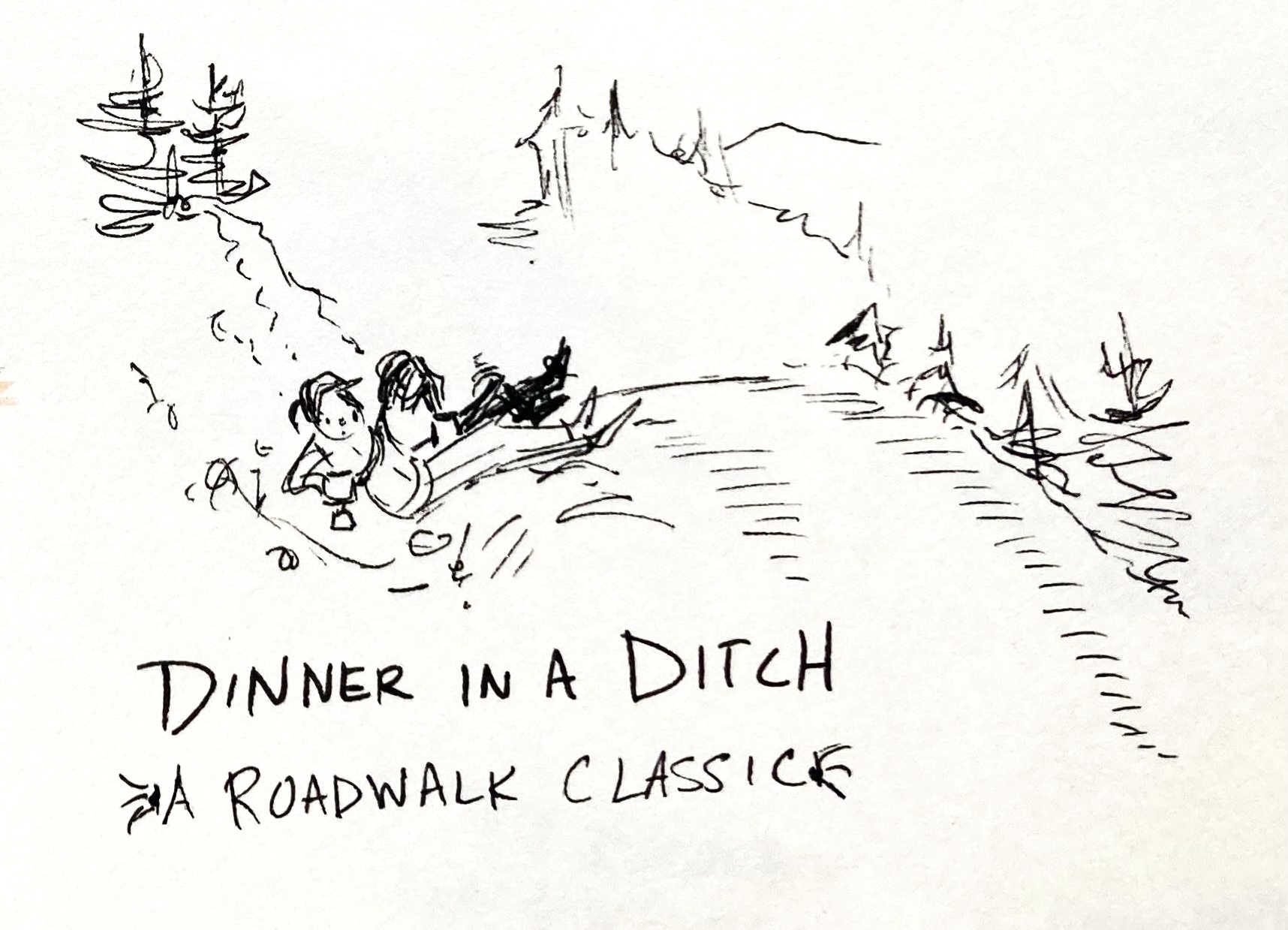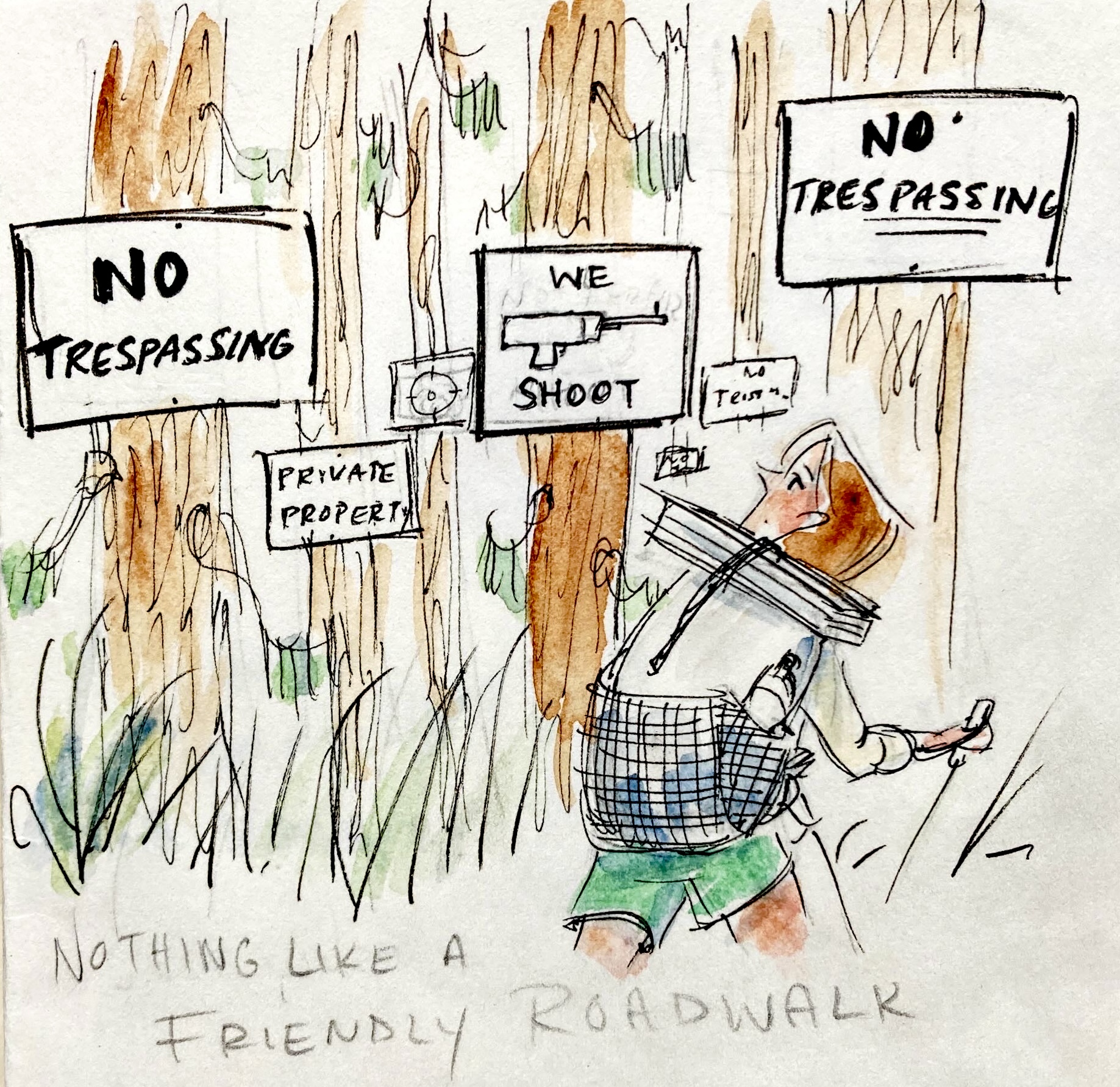I respect private property, but does it respect me?
I try to be respectful as a thru hiker – aware of the places I move through, the resources I use, the impact of my trash, my words, my poop, my tread.
My thru hikes are made easy by the work of hundreds – those who plan these trails, and maintain both the footpath and the relations with local land owners and communities. Those who broker agreements and create goodwill and stitch together these partnerships of public and private land. On The CDT, as a newer trail, you can see these stitched seams clearly and on the Pacific Northwest Trail even more so – some of the gaps have not yet been stitched tight and you have bushwhacks and long road walks to bridge the divides. Because of this hard work done by others and because of the hikers to come after me, I am respectful of private property in practice, though I have my disagreements philosophically.
Hikers, once started, will sometimes wax on about ideas like “the commons” and various “right of way” laws and customs in places like Great Britain and Scandinavia.
And, idealistic though they often are, I think these conversation are an important piece of reimagining reality, especially if the goal is meaningful cultural shifts, rather than abrupt, total change. I certainly don’t think private property should be abolished, but I do think we can revisit the middle ground. Revisit, for example, the idea that we need to prohibit pedestrians from stepping off the road for a bit of shade or to fill a bottle from a stream. Revisit the idea that the best way to prohibit them is with miles of barbed wire and threats of legal action or immediate, legally sanctioned death.
Is there a difference between the land surrounding a house and hundreds of acres of private property far from any structures? Is there a difference between getting a liter of water and a safe place to sit off the road and lounging on someone’s front porch? Should prosecution or violence be an accepted first reaction to a stranger on someone’s land?
What a contrast to the Greek myths, to other times and places where hospitality to strangers is deeply valued.
Can we think of land use in a more nuanced way than “it’s all mine or anything could be up for grabs?” What could that nuance do for us, land owners and non-land owners alike?
A moment – walking towards where all of our maps indicate national forest and finding instead another 6 unexpected miles of no trespassing signs before finally reaching public land.
A moment – guys driving by in their truck in a long stretch of private property and, unasked, offering up their land down the road if we wanted to rest or camp for the night.
A moment – a many-mile road walk on the CDT ending finally in national forest and the great flooding feeling of relief of reaching somewhere like home – somewhere we could take off our smelly shoes and shirts and lay them in the sun, where we could pull out our tents to dry, wash our socks, fill our water bottles, cook a meal, pee, sprawl in the shade to nap.
All such basic human behaviors – to get clean, to dry off, to move between sun and shade, to drink and eat and pee and sleep – but things that are often barred by law or social code, or restricted to those who can pay for the privilege or those who look a certain way.
Of course, as a white lady I’m allowed to be many places unhassled, places that are denied to others in explicit or less explicit ways. And as a woman I’ve often been told some places aren’t for me because of some perceived, ever simmering danger.
For me, one of the chief joys of the long trails is this – the ability to just do and be, for long stretches of time, across a beautiful, changing landscape, without constantly asking or paying for permission.
This hiker in particular could wax on about such things but suffice it to say, at times this hike feels like it has as many no trespassing signs as trees.
Northport to Priest Lake
We set off from Jennifer and Ty’s, filled with that particular warm glow that only comes from time with trail angels.
Road switches to trail and we climb Abercrombie mountain. It’s buzzing with sweat bees and flies at the top, but it’s got stunning views and well maintained trail – both a treat. Then it’s down the mountain to camp on a logging road pullout and your classic picturesque dinner in a ditch.

When your options are road, ditch and slope, the ditch is the obvious choice since it’s clearly a back country lazy boy recliner.
Metaline Falls is small, hot and friendly. We hang out with Mary, a wonderful trail angel set up in town. We end up resupplying a little too little because our hiker brains are too hot to think straight.
The Resource Game
The short resupply means our stretch from Metaline Falls to Bonners Ferry is a bit of a dance. We’re a bit short on calories, nothing dangerous but something I’m aware of the whole time. We’re also a bit short on power – leaving town that evening with our backup batteries not quite fully charged up. And there was no fuel for sale in Metaline so we’re rationing that – no coffee for Skunkbear this leg. On our hike the next day Sashay’s back feels a little tweaky so we slow down a bit despite our light food bags.
The day into Priest Lake has an ancient cedar forest with a quiet, spacious grandure. Drifts of old needles dampen any sound and this sacred space, like the best ones, can be enjoyed with shoes and socks cast off, toes dug into to the dirt, quietly crunching on Doritos and idly watching an unheard breeze ripple the greens.
As a counterpoint to this calm, by the time we reach Priest Lake I am crazed – the clouds of mosquitos chasing us blot out all rational thought and I am reduced to an animal being eaten, albeit an animal with a fancy tent to frantically set up and dive into. In fact, I wouldn’t at all be sure that this is really Skunkbear writing this and not a million-mosquito horde who, having drained all of Skunkbear’s blood, are now wearing her skin around, animating her body just to get close to their next victim. Really makes you think.
This website contains affiliate links, which means The Trek may receive a percentage of any product or service you purchase using the links in the articles or advertisements. The buyer pays the same price as they would otherwise, and your purchase helps to support The Trek's ongoing goal to serve you quality backpacking advice and information. Thanks for your support!
To learn more, please visit the About This Site page.



